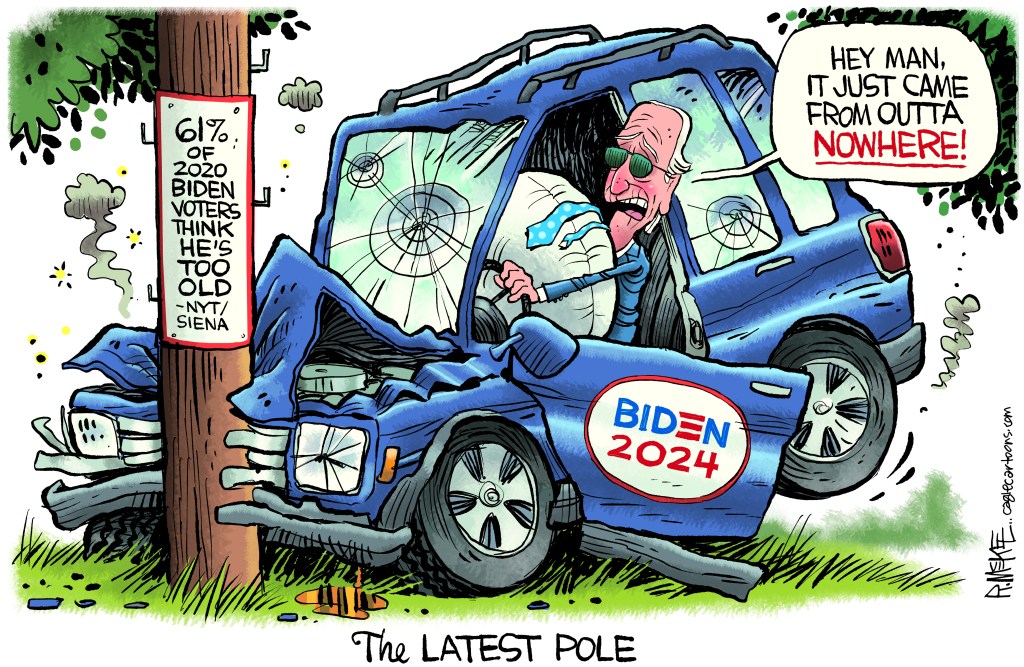Joe ‘it’s not my fault’ Biden
Published 12:09 pm Tuesday, April 2, 2024

- Political Cartoon, April 2 2024
With President Joe Biden’s approval ratings lodged stubbornly on the minus side – some by as much as 30 percent – his re-election campaign team seems to be teetering in the verge of desperation to strike a message and drive a narrative to halt the slide.
In the Real Clear Politics polling averages, the president remains mired at 40 percent approval, while a stunning 65 percent believe the nation is headed in the wrong direction.
Biden is in the red on his handling of the economy, immigration, foreign policy, inflation, crime and the Israel-Hamas war.
Adding to the bleak outlook is the alarming decline in support from African American and Hispanic voters – two normally reliable constituencies vital to his re-election prospects.
With seven months remaining before election day, a dramatic reversal in public sentiment appears problematic. He has fallen behind his Republican opponent, Donald Trump, by as many as five points – a precarious position for an incumbent president.
The latest Biden campaign strategy to emerge is to deny responsibility and assign blame to others.
The unprecedented influx of immigrants overwhelming the southern border and creating an economic, humanitarian and public safety crisis in large cities, is attributable to former president Trump and a Congress unwilling to act on immigration reform, according to Biden.
The argument reached an absurd level when White House Press Secretary Karine Jean-Pierre claimed the storming of a barbed wire fence near El Paso by hundreds of migrants was the fault of Texas Gov. Greg Abbott. And, as is her usual reaction, refused to provide any evidence to support her claim and refused to respond to follow up questions.
Driving the high cost of living and the relentless rise in price is corporate greed exacerbated by “shrinkflation,” the nefarious practice of reducing the amount or size of a food commodity while increasing its price, according to Biden
Fault for inflation and a sour economy lies with those wealthy Americans and corporations who refuse to pay their fair share in taxes, according to Biden.
This “not my fault” posture is a natural outgrowth of a strategy to frame the election as a referendum on Trump rather than one on the Biden administration.
The months of consistent polling results and the chronic expressions of disapproval, though, suggest a majority of the American people simply are not buying it. They see what they see, feel what they feel and no amount of persuasion from the administration will convince them to believe otherwise.
There exists a firm belief among Democratic party leaders that the president’s struggles can be resolved by more effective messaging, that a strong, coherent campaign highlighting his legislative achievements will stem the tide.
It welcomes the idea that a referendum on his administration is the prism through which most Americans see him and advantage can be gained through a broadly coordinated effort to focus attention on his first term accomplishments and a vision for a second term.
Criticizing Trump will certainly be a major component of the campaign – and there’s a wealth of material at hand – but providing a reason, a rationale, a justification for a second Biden term is crucial.
A president – any president – is the undisputed leader of the country, the only individual elected to office by all the people and entrusted with keeping the nation safe and prosperous while rising to confront crises and overcome them.
The president receives the credit for successes and the criticisms for less than desirable outcomes.
Attempting to escape blame by pointing fingers at political opponents seldom succeeds over the long haul.
Truman’s “the buck stops here” philosophy of governing was uttered some 75 years ago, and in the minds of the American people it retains a level of relevance and resonance to this day.
Time is running out and spending energy and resources on a questionable strategy of blaming others will not reverse poll numbers or ease national anxieties.
Carl Golden is a senior contributing analyst with the William J. Hughes Center for Public Policy at Stockton University in New Jersey.





